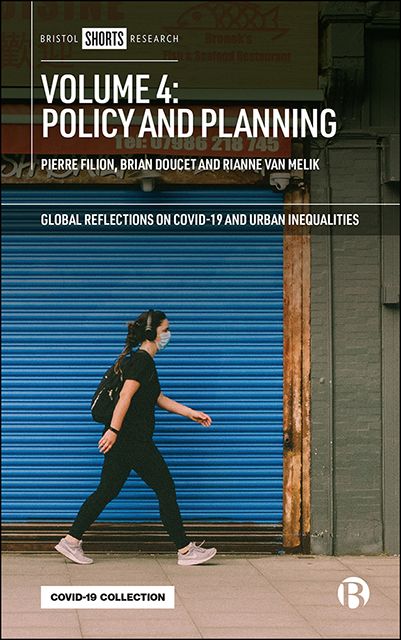Book contents
- Frontmatter
- Contents
- List of Figures and Tables
- Notes on Contributors
- Acknowledgments
- Preface to All Four Volumes of Global Reflections on COVID-19 and Urban Inequalities
- One Introduction: Policy Making in the Face of Uncertainty and Inequality
- Part I COVID-19 and Urban Changes
- Part II The Pandemic, Social Inequality, and Mobilization
- Part III Municipal and Urban Policy Responses
- Index
Five - Governing ‘the Night’ in Post-COVID-19 Lisbon: Challenges, Opportunities, and Uncertainties
Published online by Cambridge University Press: 25 April 2023
- Frontmatter
- Contents
- List of Figures and Tables
- Notes on Contributors
- Acknowledgments
- Preface to All Four Volumes of Global Reflections on COVID-19 and Urban Inequalities
- One Introduction: Policy Making in the Face of Uncertainty and Inequality
- Part I COVID-19 and Urban Changes
- Part II The Pandemic, Social Inequality, and Mobilization
- Part III Municipal and Urban Policy Responses
- Index
Summary
Introduction
As a result of the COVID-19 pandemic and the unprecedented lockdown imposed by several national governments, the nighttime leisure industry has stalled in many cities worldwide. In Lisbon, Portugal's capital city, an increasing number of voices from the nightlife industry have aired their concerns regarding the profound consequences that the indefinite interruption of this economic activity caused by the pandemic might have for the sector, as well as for ancillary industries such as tourism, beverage companies, DJs, artists, and so on. Along with the gradual destruction of thousands of jobs, and the consequent growing financial imbalance in the sector, there is the definitive closure of a significant number of clubs and discotheques.
From the perspective of institutional and social actors such as the City Council, the governing bodies of civil parishes, residents’ associations from the city center, and anti-touristification movements, the indefinite closure of nightlife venues has placed the problems caused by the expansion of tourism-related nightlife, regulated or not, on hold. In this sense, livability in central Lisbon's nightlife districts has improved significantly since the lockdown. This is the case for Bairro Alto and Cais do Sodré, two historic neighborhoods transformed into crowded nightlife spots over the past two decades. In these two areas, nocturnal silence has become the most appreciated intangible benefit brought to the areas’ residents by the COVID-19 lockdown. As the Portuguese journalist, Catarina Nunes, reported in late April:
Goodbye to people drinking and shouting outdoors, to street musicians playing with amplifiers, to gang brawls, to drug dealers, to raids and to sirens of patrol cars, ambulances and firefighters, during the day and at night, which not even double-glazed windows can keep out. (Nunes, 2020, translated from the original by authors)
One could argue that the pandemic has addressed what both the City Council and local actors of the urban night had not been able to achieve in recent years: namely, the peaceful coexistence of the ‘right to party’ with ‘the right to a peaceful night's sleep’ in areas characterized by an intense nightlife. More importantly, it highlights the City Council's inadequacy in governing the ‘Nocturnal Tourist City’ (Giordano et al, 2018) following the first wave of touristification (Sequera and Nofre, 2019) and studentification (Malet Calvo, 2018) that swept through Lisbon in the late 1990s.
- Type
- Chapter
- Information
- Volume 4: Policy and Planning , pp. 47 - 58Publisher: Bristol University PressPrint publication year: 2021



